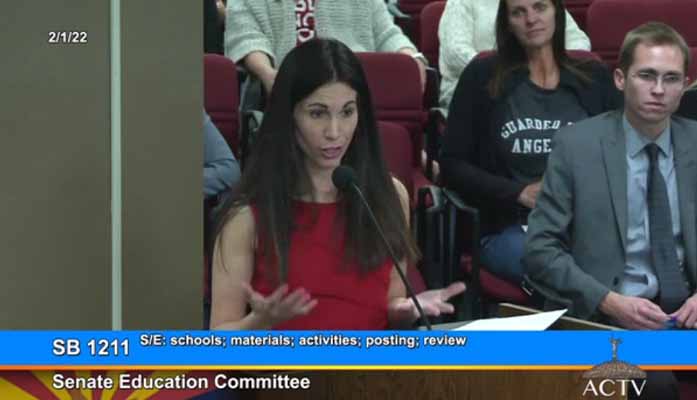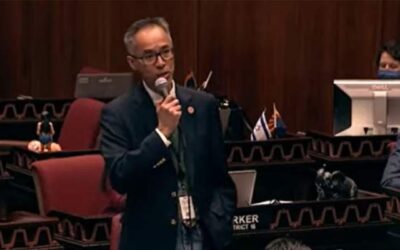By Corinne Murdock |
The Arizona Senate Education Committee passed a bill to ensure K-12 schools afford greater transparency to parents concerning the content and adoption procedures for curriculum and all other learning materials. The bill, SB1211, passed 5-3 along party lines. 20 states have introduced similar legislation; the Wisconsin legislature passed a similar bill last year but their governor vetoed it; most recently, the Indiana House moved another similar bill forward. However, no other state has the same legislative language as SB1211.
Specifically, the 14-page bill would require schools to post online in a searchable manner all learning material adoption procedures as well as the content organized by subject, grade, and teacher. The specified learning material covered requires readings, videos, audio, digital materials, websites, instructional handouts, worksheets, apps, assemblies, guest lectures, civics assignments or projects, and service learning projects. Any educational materials concerning nondiscrimination, diversity, equity, inclusion, race, ethnicity, sex, gender, bias, action-oriented civics, service learning, or social and emotional competencies must be referenced in full online at least 72 hours before implementation. Materials outside that scope must be posted online within a week of their implementation and remain accessible on the site for two years. The bill also would require schools to allow all throughout the school day as well as a half an hour before and after school hours for textbook review prior to adoption.
Parents could seek redress for violations of this bill by first submitting a complaint to the school principal. If the principal doesn’t investigate and respond within 15 days, or the response doesn’t solve the issue satisfactorily, parents could submit a complaint to their school board. If the board doesn’t respond adequately or at all within 25 days, then parents may take legal action against the school’s governing body. No teachers would be subject to punishment.
State Senator Nancy Barto (R-Phoenix) insisted all she was introducing was a “simple […] common-sense transparency bill.” Barto clarified that the bill would allow parents a heads-up about what their children would learn.
“So many parents are so frustrated at not having access to what their children are learning in schools. There are so many things that are accessible online now, and curriculum needs to be one of them,” said Barto.
Parent after parent highlighted personal and local incidents concerning willful lack of transparency from their schools and districts. In addition to parents, the Arizona Coalition of School Board Members and Heritage Action for America showed up to support the bill. A handful of teachers, most of them masked, and the Arizona Education Association (AEA) spoke out against the bill. They argued that the bill would create an undue burden on teachers and districts, foster distrust and malcontent between parents and teachers, and even further reduce educational quality. The Arizona Charter School Association (ACSA) was also reportedly against the bill, according to State Senator Gonzales, but none of their representatives gave testimony before the committee on Tuesday.
The first to provide public commentary on the bill was none other than Nicole Solas — the Rhode Island parent sued by her state’s teacher’s union, the National Education Association of Rhode Island (NEARI) for her public record requests and represented by the Goldwater Institute, the Phoenix-based conservative public policy and litigative think tank.
Solas told the committee that her story was a cautionary tale of what occurs when a state doesn’t have academic transparency. Her story began when she requested information about the education her daughter would receive, and learned that the school taught about gender at every grade level in “age-appropriate ways,” as well as teaching five-year-olds on the first day of Thanksgiving what could’ve been done differently during the pilgrim’s Thanksgiving. When Solas attempted to ask more questions about the curriculum, her school told her to submit public records requests. After doing so, the school board of her district put her name on the agenda of a public meeting with a threat to sue her for her records requests.
Solas recalled how the five hour meeting was filled with public harassment and open debates on her moral character and motivations by the board members. Solas shared further that her district then hired a public relations firm to defame her in the national media. The local teacher’s union then decided to sue Solas for filing those records requests. Even after enduring all of that eight months later, Solas said her original requests have gone unanswered. All she received was outdated curriculum; the district told her she hadn’t asked specifically for the current curriculum.
“What they did to me was government abuse of power just because I wanted to know what was being taught,” said Solas. “This is a kafkaesque, bureaucratic problem with a very easy academic solution.”
It wasn’t just the blame from the district that presented a problem to Solas — it was the cost of the records requested. Solas insisted that the cost to districts to fulfill public records requests was unnecessary, and that public schools needed to be protected from squandering their education dollars.
“Pass this bill for public schools and you can save them from themselves. We need our education dollars to be spent on students, not on a petty stand-off between schools and parents,” said Solas. “These are the games they play with public records requests. Our children’s education is not a game.”
Majority Leader Rick Gray (R-Sun City) said Solas’ story was heartbreaking to hear, and expressed condolences for the plight of New Jersey’s children.
“They wanted to send a message that if you want transparency […] they will retaliate against you and punish you for asking for transparency,” relayed Solas.
State Senator Christine Marsh (D-Phoenix) asked Solas if New Jersey had a parental bill of rights similar to Arizona’s. She added that she didn’t understand what Solas’ issue had to do with Arizona schools. Solas said they don’t have anything like that in her state, and informed Marsh that the Phoenix-based Goldwater Institute is representing her for the lawsuit.
Goldwater Institute Director of Education Policy Matt Beienburg offered insight from Arizona teachers in support of the bill. He read a letter from Jessica, an English teacher, who described how she covered over 70 absences in one week and insisted on the bill because it provided an “easy safeguard” for creating a “workshop” between families and schools.
“This bill is pro-student, pro-parent, and pro-teacher,” asserted Beienburg.
State Senator Tyler Pace (R-) asked what a pragmatic solution would be, instead of this bill. Thomas said the best solutions would be at the local level. He said parents already had “a lot of tools” to get the transparency they need.
“The unintended consequence of this is that kids are going to suffer in that their interests aren’t going to be explored at any given instance during the day,” asserted Marsh.
Gray pressed AEA President Joe Thomas, who insisted that better answers were to be had, to give them a tangible solution. Thomas couldn’t. Instead he repeated that parents had the tools to investigate the curriculum themselves. Gray insisted that wasn’t enough of an answer.
“When we see this as a legislative body and this is brought to us, it is our responsibility to see what we can do to solve this problem. Ideally we would never get this problem here because the schools would take care of it,” responded Gray. “We don’t have any solutions from the education industry, but we clearly have problems from the parents.”
In closing public remarks, Beienburg cited how an AEA spokeswoman last year reported that she submitted curriculum materials regularly to her district officials for review.
“That’s indicative of the fact that this is doable,” said Beienburg.
Corinne Murdock is a reporter for AZ Free News. Follow her latest on Twitter, or email tips to corinne@azfreenews.com.








